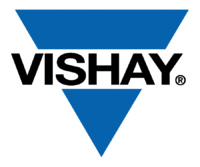Vishay Intertechnology
 | |
| Public | |
| Traded as | NYSE: VSH |
| Industry | electronics |
| Founded | 1962 |
| Headquarters |
Malvern, Pennsylvania, United States |
Key people | Marc Zandman, Executive Chairman, Chief Business Development Officer, Dr. Gerald Paul, President and CEO, Chief Technical Officer |
| Products | rectifiers, diodes, MOSFETs, optoelectronics, selected integrated circuits, resistors, capacitors, inductors |
| Revenue |
|
Number of employees | approximately 20,900 (2011) |
| Website | www.vishay.com |
Vishay Intertechnology, Inc. is an American manufacturer of discrete semiconductors and passive electronic components. Vishay has manufacturing plants in Israel, Asia, Europe, and the Americas where it produces rectifiers, diodes, MOSFETs, optoelectronics, selected integrated circuits, resistors, capacitors, and inductors. Vishay Intertechnology revenues for 2011 were $2.594 billion. As of December 31, 2011, Vishay Intertechnology had approximately 20,900 full-time employees.[1]
History
Vishay Intertechnology was founded in 1962 by Dr. Felix Zandman. The Company was named after Dr. Zandman’s ancestral village in Lithuania, Veisiejai. It began operations with a patented technology that had two product lines: foil resistors and foil resistance strain gauges. In 1985, having grown from a start-up into the world's leading manufacturer of these original products, the company began an ongoing series of acquisitions to become a broadline manufacturer of electronics components.[2]
Having expanded into so many product lines, Vishay announced in October 2009 that it would be creating a spin-off company which focuses on their high precision technologies in Foil Technology. Vishay Precision Group represents approximately 9% of Vishay annual revenue, and included their product lines in Bulk Metal Foil Resistors, micro-measurements, load cells, process weighing, and on-board weighing.[3][4] In July 2010, Vishay Intertechnology completed the spin-off of Vishay Precision Group (VPG).
Since 1985, Vishay has pursued a business strategy that principally consists of the following elements: expanding within the electronic components industry, primarily through the acquisition of other manufacturers of electronic components; reducing expenses; transferring manufacturing operations to countries with lower labor costs and government-sponsored incentives; maintaining significant production facilities in regions where Vishay markets the bulk of its products; continually rolling out new products; and strengthening relationships with customers and strategic partners. As a result of this strategy, Vishay has grown from a small manufacturer of precision resistors and resistance strain gages to one of the world’s largest manufacturers and suppliers of a broad line of electronic components.[5]
Some of the manufacturers that Vishay has acquired include HiRel Systems (2012), the resistor business of Huntington Electric (2011), the wet tantalum capacitor business of KEMET (2008), the PCS business of International Rectifier (2007), BCcomponents and Beyschlag (2002), General Semiconductor, the infrared components business of Infineon, Mallory (NACC), and Tansitor (2001), Cera-Mite, Electro-Films, and Spectrol (2000), Siliconix and Telefunken (1998), Vitramon (1994), Roederstein (1993), Sprague (1992), Sfernice (1988), Draloric (1987), and Dale (1985).[6]
The former Spectrol Reliance factory in Swindon, England, (UK arm of Spectrol Electronics that was acquired by Vishay in 2000, originally known as Reliance Controls) was the last design by Team 4 (Richard Rogers, Norman Foster and their respective wives), and is considered the first example of High-tech architecture in the United Kingdom. It opened in 1967 and was demolished in 1991, Spectrol Reliance moving to a different part of Swindon.[7]
See also
References
- ↑
- ↑ Vishay. "Company Info - About". Vishay. Retrieved 2013-10-21.
- ↑ "VPG - Home Page". Vishaypg.com. Retrieved 2013-10-21.
- ↑ (PDF) https://web.archive.org/web/20100120063141/http://www.snl.com/Cache/1500024614.PDF?D=&O=PDF&IID=4165163&Y=&T=&FID=1500024614. Archived from the original (PDF) on January 20, 2010. Retrieved June 17, 2010. Missing or empty
|title=(help) - ↑ http://www.snl.com/interactive/lookandfeel/4165163/VSH_2009.pdf
- ↑
- ↑ "Richard Rogers, Architect (1933–), From the House to the City". Design Museum. Archived from the original on 20 October 2010. Retrieved 2010-10-12.